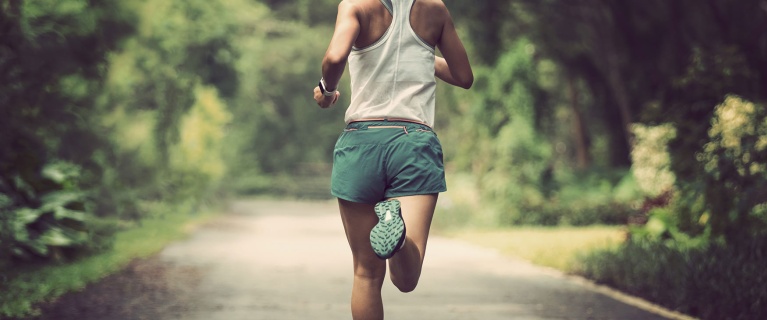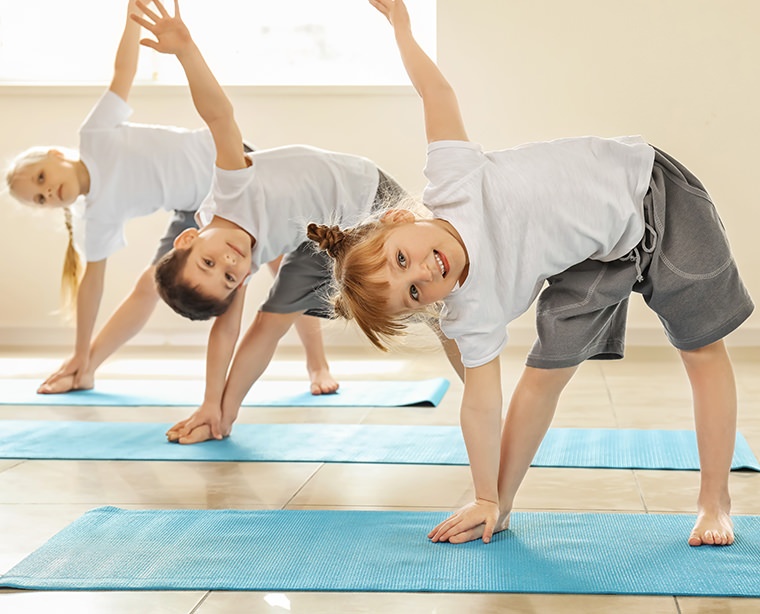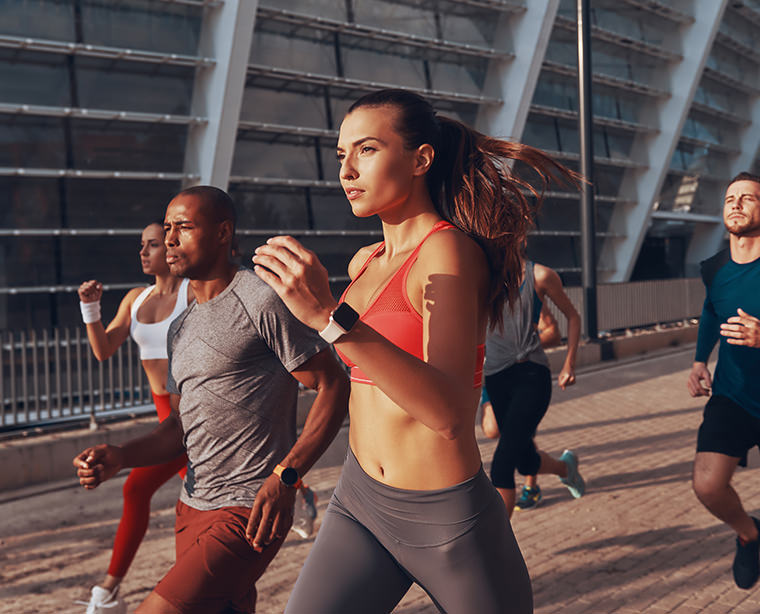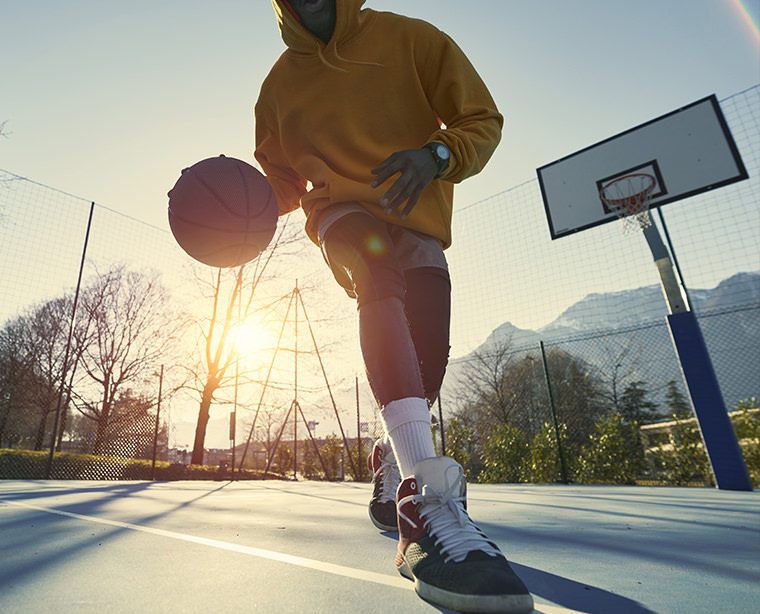

Advice and tips so that you have total freedom to play sports!

The benefits of regular physical sports activities require no further demonstration, particularly where children and teenagers are concerned. They can be seen in many areas, including physical development, psychological well-being, self-knowledge or relationships with others.
The body needs sport to develop
Children have an irresistible urge to burn off their energy by combining pleasure and well-being. That works out well, since physical activity is vital for developing the muscles and skeleton as well as for maintaining a good weight-to-height ratio.
Additionally, the hormone that stimulates tissue growth is secreted during sleep, yet the sleep of atopic children is often disturbed by pain and itching.
Severe atopic dermatitis in infancy can therefore lead to delayed growth and a very thin build.
By regulating sleep and stimulating muscle and bone development, physical activity can lessen these phenomena.
Lastly, for adolescents who tend to spend long hours in front of their computers, games consoles and other screens, sport is a good way of countering physical inactivity and establishing healthy lifestyle habits.
Sport helps children to feel good about themselves
In atopic children, taking part in a physical sporting activity is also a good way of directing their attention outwards and so of being less preoccupied by their skin problems.
And not only that, but de-stressing is easier and concentration is better at school. Whether played for the performance or just for the fun, sport promotes team spirit. It helps to develop a sense of belonging to a group and so to create one's own identity.
The children pit themselves against their friends in team sports and against their own abilities in individual sports. Endorphins, the hormones released by the brain during and after exertion, are also of great help in fighting stress.
Why do atopic children play less sport?
Atopic dermatitis affects children's quality of life. They can find it hard to expose their damaged skin to their friends. They tend to avoid group physical activities, especially since sports activities can trigger a flare-up because of heat or the irritating action of sweat.
In a study conducted online by the Eczema Foundation, 92% of children took part in a sports activity at school or with a club. However, this figure fell to 78% among children with atopic dermatitis. This is because physical activities can cause discomfort in children with the condition (Figure 2), so it can prove difficult to keep going. Yet physical activity and playing sport are essential for children's development, and some simple precautions can prevent them from being uncomfortable or unpleasant.
It is true that sweating can cause itching or even flare-ups, but this can be prevented with a few simple measures.
Showering immediately after sport removes the irritating substances found in sweat. In practical terms, count to 30 under lukewarm or cool water for this to be effective. It is recommended to use a soap- and fragrance-free shower product. Then simply apply an emollient cream to the entire body and put on clean, dry clothes, and that's all there is to it!
Ways of avoiding the slightly unpleasant aspects of physical activity
Sweat, heat, and ill-suited clothing and personal care products can aggravate atopic skin if we are not careful. Here are some precautions that can prevent tingling, itching and eczema flare-ups so that children can fully enjoy their sporting activity.
Minimize the irritating effect of sweat
Sweat is produced by the sudoriferous glands, or sweat glands, which contribute to natural thermoregulation. These glands are more abundantly found in the forehead, palms of the hands, soles of the feet and armpits.
Composed mainly of water and mineral salts, sweat has an acid pH (between 4 and 6) and the sodium chloride it contains causes the stinging effect felt on the skin. To prevent this uncomfortable sensation, you need to facilitate evaporation. Wear loose clothes made of cotton, or specific sports clothes with breathable areas that allow the heat to escape.
Allow heat to escape
Heat causes blood vessels to dilate (redness) and increases the production of sweat and therefore itching.
How can you prevent this?
First, do not play sport in direct sunlight and remember to drink fluids regularly – always keep a bottle of water with you.
Then, as soon as you start to feel the heat, use a thermal water spray. As it evaporates, the water will bring the skin's temperature down. Training progressively allows the body to adapt and is the best way to avoid
overheating. During periods of eczema flare-up, it is better to avoid any sports requiring intense effort.
Wear suitable clothing
Numerous types of clothes are suitable for playing sport. With cotton clothing, go one size bigger to reduce contact with the skin, with the seams on the outside if possible, or sports clothing made of lightweight polyester.
Whatever clothing is purchased, it must be washed before wearing.
Remember to cut off all the labels (in the neck and on the sides) to prevent irritation.
Clothing must be washed after each use – do not leave it in the sports bag!
To wash clothes, liquid detergents should be used rather than powder ones, which do not dissolve as easily and must be rinsed well, twice if possible. Avoid drying the clothes outside during the pollen season.
Put deodorant on after exercise rather than before it
Anti-perspirants containing aluminium salts are to be avoided. Choose alcohol- and fragrance-free deodorants instead.
Despite these precautions, sweat and deodorant can cause irritation.
Since sweating comes after exercise, it is preferable to apply deodorant after the physical activity (not before), after the shower and once the skin has been well dried with a soft polyamide towel.
Advice and tips for keeping exercise fun
Before
- Applying a moisturizer or emollient to the skin before playing sport helps to build a protective acid mantle.
- Stay away from very heavy exercise during acute episodes of atopic dermatitis so as not to aggravate the development of redness.
- Opt for sports in which perspiration is allowed to evaporate properly – avoid fencing outfits, for example.
During
- Wear suitable clothing made of cotton (buy one size up) or specific sports clothing.
- Do not play sport in direct sunlight.
- Use a mineral water spray and remember to drink (in small amounts) during exercise.
- Wipe off sweat using a wristband or a soft towel, and not your t-shirt.
After
- Maintain good hydration by drinking plenty of mineral water.
- Wait a short while before diving into the shower because the body begins to sweat a little after exersise.
- Shower with large amounts of clear lukewarm water (and stay in the shower until you have counted to 30) and use a soap- and fragrance-free shower gel.
- Pat the skin dry without rubbing using a soft cotton or microfibre towel.
- Apply an emollient cream or lotion, even in winter.
- Use a topical corticosteroid in the evening on red areas.
The skin's red appearance can bother children who are afraid of being singled out and exposed in front of other children. But this must not be a block to taking part in a physical activity.
Parents must explain what eczema is to the school teacher or sports instructor, that it is not contagious, and what basic precautions need to be taken.
It must also be explained to the children that everyone is different, and they must be helped to accept how they are different. In eczema, the skin is visibly red. But this is simply a difference, as some people have blonde hair whereas others have darker hair, and so on.


